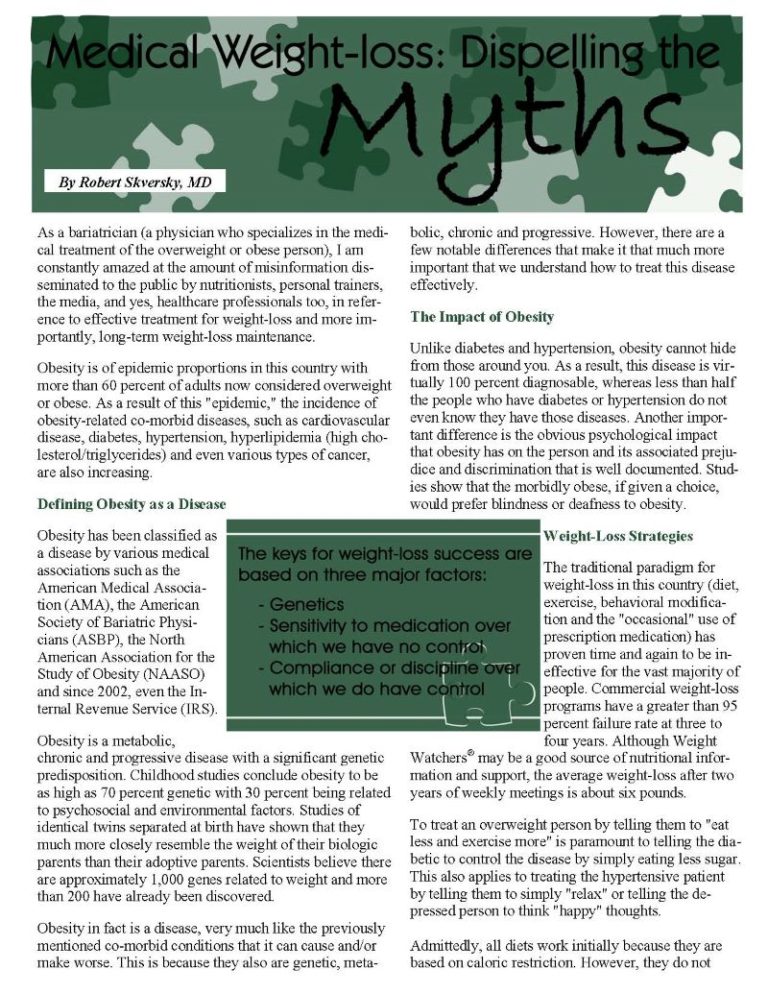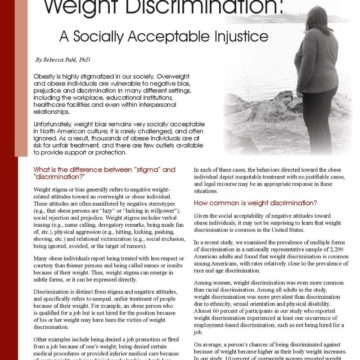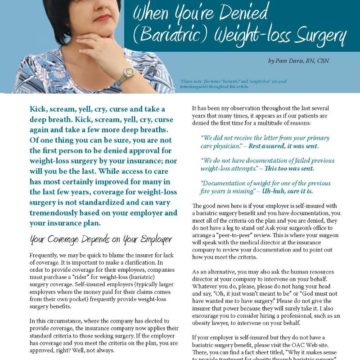Medical Weight-loss: Dispelling the Myths


By Robert Skversky, MD
Winter 2006
As a bariatrician (a physician who specializes in the medical treatment of the person with excess weight or obesity), I am constantly amazed at the amount of misinformation disseminated to the public by nutritionists, personal trainers, the media, and yes, healthcare professionals too, in reference to effective treatment for weight-loss and more importantly, long-term weight-loss maintenance.
Obesity is of epidemic proportions in this country with more than 60 percent of adults now considered to be affected by excess weight or obesity. As a result of this “epidemic,” the incidence of obesity-related co-morbid diseases, such as cardiovascular disease, diabetes, hypertension, hyperlipidemia (high cholesterol/triglycerides) and even various types of cancer, are also increasing.
Defining Obesity as a Disease
Obesity has been classified as a disease by various medical associations such as the American Medical Association (AMA), the American Society of Bariatric Physicians (ASBP), the North American Association for the Study of Obesity (NAASO) and since 2002, even the Internal Revenue Service (IRS).
Obesity is a metabolic, chronic and progressive disease with a significant genetic predisposition. Childhood studies conclude obesity to be as high as 70 percent genetic with 30 percent being related to psychosocial and environmental factors. Studies of identical twins separated at birth have shown that they much more closely resemble the weight of their biologic parents than their adoptive parents. Scientists believe there are approximately 1,000 genes related to weight and more than 200 have already been discovered.
Obesity in fact is a disease, very much like the previously mentioned co-morbid conditions that it can cause and/or make worse. This is because they also are genetic, metabolic, chronic and progressive. However, there are a few notable differences that make it that much more important that we understand how to treat this disease effectively.
The Impact of Obesity
Unlike diabetes and hypertension, obesity cannot hide from those around you. As a result, this disease is virtually 100 percent diagnosable, whereas less than half the people who have diabetes or hypertension do not even know they have those diseases. Another important difference is the obvious psychological impact that obesity has on the person and its associated prejudice and discrimination that is well documented. Studies show that individuals with severe obesity, if given a choice, would prefer blindness or deafness to obesity.
Weight-Loss Strategies
The traditional paradigm for weight-loss in this country (diet, exercise, behavioral modification and the “occasional” use of prescription medication) has proven time and again to be ineffective for the vast majority of people. Commercial weight-loss programs have a greater than 95 percent failure rate at three to four years. Although Weight Watchers ® may be a good source of nutritional information and support, the average weight-loss after two years of weekly meetings is about six pounds.
To treat an overweight person by telling them to “eat less and exercise more” is paramount to telling the diabetic to control the disease by simply eating less sugar. This also applies to treating the hypertensive patient by telling them to simply “relax” or telling the depressed person to think “happy” thoughts.
Admittedly, all diets work initially because they are based on caloric restriction. However, they do not work long-term due to sound physiologic reasons. Almost as soon as one begins to eat less, their metabolism begins to slow down to compensate for a lower caloric intake. Similarly, when one increases caloric intake, their metabolism begins to speed up to compensate for the increase in food intake.
Many articles on diet suggest that if you want to take off 10 pounds, all you need to do is decrease your caloric intake by 500 calories a day. In one week, you will have lost 3500 calories or the equivalent of one pound, and in 10 weeks you would lose 10 pounds. Although the “math” may seem accurate, our bodies do not understand math. When you consume fewer calories your metabolism drops.
Exercise
Exercise is a very important part of any prudent long-term weight-loss program. It is important for many reasons including improved cardiovascular fitness, lowering cholesterol, increasing good cholesterol (HDL), promoting a feeling of well being, firming, strengthening, etc. However, exercise for weight-loss is highly overrated.
How many calories does one burn with exercise? The answer is “not too many.” For example, if you weigh 180 pounds and you want to lose one pound of fat, you would have to swim seven and one half miles at 25 yards per minute; or you could walk at four miles per hour (fast pace) for eight hours and cover 32 miles to lose that same one pound. The more you weigh, the less one has to exercise to lose a pound, but you have more pounds to lose, and vice versa. Parking your car further away in the parking lot or taking the stairs instead of the elevator may be great for many things, but weight-loss is not one of them. Exercise has its main advantage in a weight-loss program in helping one maintain their weight.
Dietary Supplements
What about over-the-counter (OTC) dietary supplements for weight-loss? There are currently more than 29,000 supplements on the market, and several hundred of them have been touted for weight-loss. The required labeling on these OTC products should make even the least skeptical of us suspicious: “This product has not been evaluated by the Federal Drug Administration (FDA). This product is not to be used to diagnose, treat, prevent or cure any disease.”
In addition, dietary supplements do not even have to prove that they are safe or effective. Often, when they are carefully evaluated clinically, they are found to be 99 percent less effective than claimed. Dietary supplements work best to slim your wallet, not your waist.
Pharmacotherapy
What really works for weight-loss and more importantly long-term weight-loss maintenance? Obesity is a chronic disease. Chronic diseases whether diabetes, hypertension, arthritis, high cholesterol, etc., need long-term drug therapy (pharmacotherapy) for control, not cure. At the present time, we are not able to cure these chronic diseases and the same is true for obesity. But, we are learning to control them.
As previously stated, the traditional model for weight-loss in this country has failed, and failed miserably. In this physician’s opinion, the model needs to be reversed, with pharmacotherapy as the foundation and diet, exercise and behavioral modification as essential adjuncts, and not the other way around. Since obesity is a chronic disease, prescription medications should be used either on a long-term basis, or not at all. Once a desirable weight is achieved, a maintenance program needs to be continued using pharmacotherapy, diet, exercise and behavior modification. The medications act by multiple mechanisms to promote weight-loss. They suppress appetite, control cravings, improve insulin sensitivity and lower the metabolic set point.
Keys for Weight-loss Success
The goal of any prudent weight-loss program goes well beyond weight-loss itself, but extends to the improvement in self esteem and sense of empowerment as unexpected gifts of long-term weight-loss success.
About the Author:
Robert Skversky, MD, is the Medical Director of Weight No More, and has committed the past 10 years of his professional career to the medical treatment of patients with excess weight or obesity.
by Sarah Muntel, RD Spring 2024 Spring has sprung, bringing sunnier and warmer days! For many, this…
Read Articleby Yelena Kibasova Spring 2024 The fitness world is evolving, with new trends and innovations that promise…
Read Articleby Chrystal Jones, OAC Advocacy Manager Spring 2024 The Obesity Action Coalition (OAC) is the only patient-focused…
Read Article









